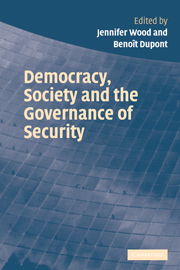Book contents
- Frontmatter
- Contents
- List of contributors
- Foreword
- Acknowledgements
- Introduction: Understanding the governance of security
- 1 Reflections on the refusal to acknowledge private governments
- 2 Transnational security governance
- 3 Two case studies of American anti-terrorism
- 4 Power struggles in the field of security: implications for democratic transformation
- 5 Policing and security as ‘club goods’: the new enclosures?
- 6 The state, the people and democratic policing: the case of South Africa
- 7 Necessary virtues: the legitimate place of the state in the production of security
- 8 From security to health
- 9 Research and innovation in the field of security: a nodal governance view
- Conclusion: The future of democracy
- References
- Index
4 - Power struggles in the field of security: implications for democratic transformation
Published online by Cambridge University Press: 22 September 2009
- Frontmatter
- Contents
- List of contributors
- Foreword
- Acknowledgements
- Introduction: Understanding the governance of security
- 1 Reflections on the refusal to acknowledge private governments
- 2 Transnational security governance
- 3 Two case studies of American anti-terrorism
- 4 Power struggles in the field of security: implications for democratic transformation
- 5 Policing and security as ‘club goods’: the new enclosures?
- 6 The state, the people and democratic policing: the case of South Africa
- 7 Necessary virtues: the legitimate place of the state in the production of security
- 8 From security to health
- 9 Research and innovation in the field of security: a nodal governance view
- Conclusion: The future of democracy
- References
- Index
Summary
Introduction
There can be little doubt that the governance of security – both in its authorization and provision modes – has undergone profound changes over the past thirty years. Academic interpretations of those changes generally focus on two phenomena that are closely linked to the erosion of a previously undisputed state monopoly: the commodification of security, and the pluralization of policing. The concept of pluralization refers to the fact that public police agencies have lost their monopoly to a myriad of private and hybrid providers, although they clearly retain unparalleled coercive and regulatory powers. Bayley and Shearing (2001) have used the term ‘multilateralization’ to describe the same phenomenon. If some of those new players or nodes remain peripheral in terms of size and power, others, such as large private security conglomerates employ thousands of agents (Johnston 2000a) and aggressively pursue new market shares alongside or in competition with public agencies. As shown in the previous example, the commodification of security goes hand in hand with its pluralization. They are two complementary concepts that allow us to understand the reconfiguration of security in terms not only of structure and functions, but also of the ties that bind all the authorizers and providers of security together. The constellation of actors that occupy the field of security rely to a large extent on open-market mechanisms to trade security goods and services in order to cater to specific – and solvent – constituencies (Loader 1999).
- Type
- Chapter
- Information
- Democracy, Society and the Governance of Security , pp. 86 - 110Publisher: Cambridge University PressPrint publication year: 2006
- 35
- Cited by

